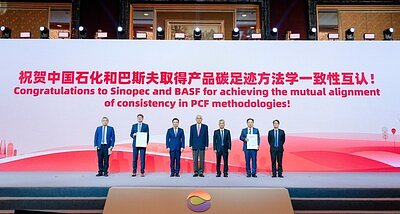
Standardizing Sustainability: Sinopec & BASF Set New Carbon Footprint Benchmark
A landmark agreement between Sinopec and BASF paves the way for standardized carbon accounting in the petrochemical industry, signaling a shift towards greater transparency & sustainability. But what does this mean for global trade & innovation?
Standardizing Sustainability: Sinopec & BASF Set New Carbon Footprint Benchmark
NINGBO, China – In a move hailed as a potential game-changer for the petrochemical industry, China’s Sinopec and Germany’s BASF have announced mutual recognition of their product carbon footprint accounting methods. Verified by independent certification body TÜV Rheinland, this agreement, unveiled at the China International Petroleum and Chemical Conference, sets a new benchmark for standardization and transparency, promising to reshape how the industry measures and reduces its environmental impact.
While many companies are grappling with carbon accounting complexities, this collaboration goes beyond individual efforts. It signifies a growing recognition that standardized methodologies are crucial for meaningful progress towards a low-carbon future – and potentially a new era of trade influenced by carbon data.
A Step Towards Global Convergence
The core of the agreement lies in a consistent approach to calculating the carbon footprint of products throughout their lifecycle, aligning with both ISO14067:2018 and China’s national standard GB/T 24067–2024. “This isn’t simply about ticking a box,” explains one industry analyst. “It’s about building trust in the data, allowing for credible comparisons, and ultimately, driving down emissions across the entire value chain.”
The move is particularly significant given China’s increasing focus on sustainability and its ambition to become a leader in green technologies. “China is actively pushing for internationally recognized standards,” says a source familiar with the country’s environmental policies. “This partnership with BASF demonstrates a willingness to align with global best practices.”
Beyond Accounting: Catalyzing Green Chemistry & Innovation
While standardization is key, the agreement's implications extend far beyond mere data collection. Experts believe it will stimulate investment in greener chemical processes and materials, fostering innovation in the field of “green chemistry.” “When companies have a clear and consistent way to measure the carbon impact of their products, they’re more likely to invest in lower-carbon alternatives,” explains a materials science researcher. “It creates a business case for sustainability.”
Sinopec, which launched research into product carbon footprinting in 2015 and achieved automated accounting in 2023, has already demonstrated a commitment to reducing its environmental impact. The company’s establishment of the Carbon Footprint Alliance for the energy and chemical industry chain underscores its collaborative approach. BASF, a long-time proponent of sustainable practices, brings its extensive expertise in chemical innovation and lifecycle assessment to the partnership.
Trade Implications & Supply Chain Transparency
However, the standardization effort isn't without potential geopolitical implications. As countries increasingly prioritize carbon emissions, standardized accounting methods could become a de facto requirement for international trade. “We could see a scenario where products with verifiable low carbon footprints gain a competitive advantage in the global market,” notes a trade policy expert. “Conversely, companies that lack this transparency might face barriers to entry.”
This could lead to increased scrutiny of supply chains, with companies demanding carbon footprint data from their suppliers. “Transparency will be crucial,” says a supply chain manager. “Companies will need to be able to demonstrate the carbon impact of every component in their products.” Both Sinopec and BASF have already begun updating their supplier codes of conduct to include carbon reporting requirements, signaling a broader industry trend.
Challenges & Future Outlook
Despite the positive momentum, challenges remain. Ensuring data accuracy and comparability across different regions and industries will require ongoing collaboration and standardization efforts. “Verification is key,” emphasizes a sustainability consultant. “Independent audits and third-party certifications will be essential to build trust in the data.”
Furthermore, the scope of carbon accounting needs to expand beyond direct emissions to encompass the entire lifecycle of products, including raw material extraction, manufacturing, transportation, and end-of-life disposal. “A truly holistic approach is crucial,” says a lifecycle assessment specialist. “We need to account for all the hidden emissions embedded in our products.”
Despite these challenges, the agreement between Sinopec and BASF represents a significant step forward in the journey towards a more sustainable future. By setting a new benchmark for carbon accounting, the two companies are not only demonstrating their commitment to environmental responsibility but also paving the way for a more transparent and accountable petrochemical industry. The implications for global trade, innovation, and the environment are profound, signaling a potential turning point in the fight against climate change. The next few years will be critical in determining whether this initiative can scale up and deliver on its promise of a truly sustainable future for the chemical industry and beyond.
